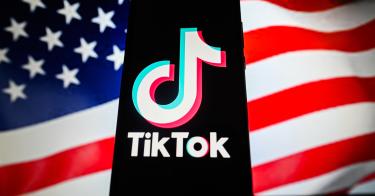The clock is ticking on TikTok, the popular social media app owned by its Chinese parent company, ByteDance.
On March 13, the House passed, by a vote of 352-65, the Protecting Americans From Foreign Adversary Controlled Applications Act, designed to “prevent TikTok’s availability on U.S. app stores unless it severs ties with ByteDance.”
While the bill’s future in the Senate is unclear, its swift movement through the House has drawn fresh attention to concerns over the threat TikTok poses and the need for a response.
What’s not new, however, is The Heritage Foundation’s long track record of warning about the threats TikTok poses to Americans.
In October 2019, Heritage’s Mike Gonzalez warned how China was attempting to manipulate public opinion in the U.S. and control free speech. “Beijing gives millions to universities in exchange for silence on its human rights transgressions, forces Hollywood studios to submit their productions to Chinese censors, and buys radio stations here,” he wrote.
>>> The U.S., Not China, Should Take the Lead on AI
In a December 2020 interview with “60 Minutes,” Kara Frederick, director of Heritage’s Tech Policy Center, spotlighted how TikTok accumulates and accesses troves of Americans’ data. “Do we want all of that information sort of hanging out there for nation-state adversaries to scoop up to integrate with other datasets?” she asked. The answer should be a resounding no.
In March 2023, Ms. Frederick published a 15-page report, “The TikTok Generation: A CCP Official in Every Pocket,” which documented TikTok’s ties to the Chinese Communist Party and exposed the tools TikTok uses to collect and track Americans’ data.
ByteDance’s own whistleblowers have confirmed as much. In 2022, former ByteDance employees alleged that the company had previously attempted to spread “pro-China content to a U.S. audience” and censor “stories unfavorable to the Chinese government” through an earlier app known as TopBuzz. That follows TikTok confirming in 2020 that the “Chinese government asked its employees to set up an account” that “showcases the best side of China.”
In 2022, after BuzzFeed News published a story providing evidence that ByteDance employees in China had repeatedly accessed U.S. user data, ByteDance was found to have launched a “covert surveillance campaign” in the U.S. in which it “tracked multiple journalists covering the company, improperly gaining access to their IP addresses and user data.”
Other leaked documents reviewed in “The TikTok Generation” include evidence of TikTok censoring news about China’s genocide against Uyghurs in Xinjiang, protests in Hong Kong, and the government’s brutal crackdown in Tiananmen Square. The paper concludes: “Every day that TikTok is allowed to operate in the United States is another day that China can collect information about U.S. citizens and sharpen its ability to exploit Americans—especially the young.”
The recently passed House bill presents ByteDance and TikTok with what Ms. Frederick calls a “clear choice: cut ties with the Chinese Communist Party and operate in the United States or immediately cease all business in our country.”
This is an important distinction. TikTok’s defenders have sought to manipulate the debate over the House bill with a flurry of false and misleading claims. Let’s set the record straight.
First, the bill does not represent a blanket “ban” on TikTok. It presents the company with a clear path to continue operating in the U.S. if it is willing to sever ties with a parent company answerable to the Chinese Communist Party. The fact that it appears unwilling to do so speaks volumes.
>>> To Protect Kids Online Today, Let’s Rethink This 1990s Law
Second, the bill is not an assault on free speech. Conservatives are right to zealously defend their own First Amendment rights and have legitimate complaints over both Big Tech censorship and government overreach in determining what constitutes “disinformation.” But as Ms. Frederick observes, “the First Amendment does not apply to the Chinese Communist Party.”
Nor does it protect China’s right to spy on Americans or collect their data. In a 2022 Legal Memorandum, Heritage scholars explained why foreign governments like China’s are not private parties eligible to invoke the First Amendment free-speech clause.
Third, the House bill would not grant the president the authority to ban American-controlled platforms, as some commentators have cynically argued. The legislation is narrowly defined to target social media platforms controlled by four specific U.S. adversaries: China, Russia, Iran and North Korea.
Finally, while some call the bill “rushed,” the debate over the threats from TikTok and the appropriate remedy has been raging for years. The U.S. government banned the use of TikTok on government phones in 2022, acknowledging the national security threats posed by an app that can serve as a vector for Chinese government propaganda, disinformation and espionage.
If the product is unsafe for government employees, why would we allow it to contaminate the phones of millions of American youth? It’s time policymakers take the threat from China half as seriously as they claim to—and end the threat from TikTok.
This piece originally appeared in The Washington Times





